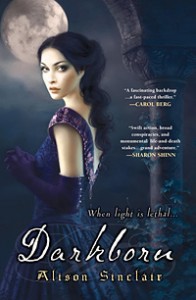When, back in the winter of 1999/2000, I received the letter telling me that my publisher was declining the option of my next novel, I set it down on the kitchen table and headed off for another 28 or so hours in ICU. The devouring intensity of my daily work immured me against any sense of disappointment or panic. I certainly didn’t imagine it would be nearly a decade before I would publish another solo novel. But to my delight, last month Anne Sowards at ROC took on my first fantasy novel, Darkborn, and its sequels, Lightborn and Shadowborn (see SF Canada news).
Getting a novel (a trilogy!) accepted is as much a kick as it was the first time around, when Deborah Beale bought Legacies and the as yet unconceived and unnamed Blueheart. When I think about it, even after 6.5 SF novels, I shouldn’t be surprised to be writing fantasy, given that I’ve been reading it as long as I’ve been reading SF. Possibly longer: though I’m not sure it counts being assigned to read The Lion, the Witch and the Wardrobe in Grade V, thereby successfully immunizing me against any interest in the series until, as a teenage skeptic, I greeted the ending with a resounding ‘ick!’. Around the time I was rejecting Narnia, I was loving Le Guin’s classic Wizard of Earthsea trilogy, full of lucid language and many-levelled subtleties, and Patricia McKillip’s wonderful The Riddle-Master of Hed. McKillip’s characters were the kind to walk around in one’s mind, not just Morgan and Raederle and Deth, but all the supporting characters: Mathin, Reed, the Morgol, Lyra, … even those whose names I can’t remember. The year I read it, too, I was intensely homesick; Morgan’s loss of the land-rule of Hed, the sense of every root, twig and farmer, was more than a plot point to me.
Then there was Tolkein. My local bookshop in Edinburgh – I think it was Munroes of Morningside – had a copy of The Hobbit, puffin edition, with a sepia wash line drawing of a dragon on the cover. I am now enlightened enough to know the drawing was the author’s own, but then I mentally catalogued it as one of ‘their books’ – dull, worthy books that adults thought children ought to read. It was Ursula Le Guin’s essay "The Staring Eye" that hooked me on the Lord of the Rings in my last year in undergrad. I recall meeting Faramir over a venerable NMR machine with a taped sign "Wipe sample before inserting"; I was a less than diligent chemistry student that week. The ‘looks dull’ stigma also attached itself to Robin McKinley’s The Blue Sword – it was a Newbury winner, after all – and delayed my finding my way into the fascinating land of Damar. One of the attractions that fantasy has always had for me is the importance of place; the setting, the land, as a character in the story.
Some years later, I couldn’t pass by a book that started, "The worst thing about knowing Gary Fairchild had been dead for a month was seeing him every day at work." Thus I discovered Barbara Hambly. I found myself in Philadelphia and Darwath at the same time, and Gil’s deductive reasoning to the heart of the mystery around the Dark delights the scientist in me. But my favourite Hambly bit still has to be this piece of build-up-and-twist, from Dog Wizard:
A thing loomed suddenly from the darkness, a huge shape stooping under the seven-foot arch of the ceiling. Even the pallid light shed by the nodule that dangled, like a third eye, from the front of the platycephalic skull threw no more than a firefly sheen on the stretched, squamous green of its hide. Spider, dragon, and eldritch nightmare; chisel teeth glistened on the lipless muzzle; four long arms, four massive hands thick with claws between which writhed clusters of wriggling tentacles. Those hands, Antryg knew well, could crush a man’s skull. It raised one as it stepped forward.
"Do you have any idea," Antryg gasped, leaning against the wall for support, "what the hell is going on?"
"Not the slightest," the monster replied.
There are more books, many more books; I could reminisce for at least another two or three hours, but shouldn’t, not at this hour. First thing tomorrow I have a date with some imaginary people expecting me to get them out of the various fixes I’ve landed them in.
